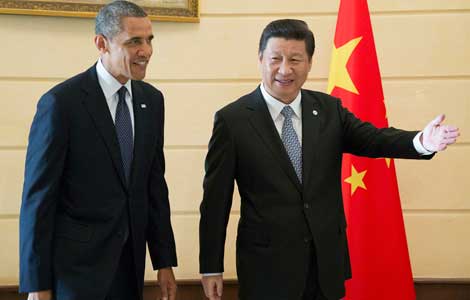US service providers eye Chinese market
Updated: 2013-09-06 07:18
By Yao Jing (China Daily)
|
||||||||
Service providers from the United States are trying to expand their presence in the world's second-largest economy, as the service sector is becoming a crucial driver of growth amid China's economic rebalancing process.
"China's economy is entering a very difficult transition phase. The service sector in China is ripe for further development as we move to a more knowledge-intensive economy," said Gregory Gilligan, chairman of the American Chamber of Commerce in China.
AmCham China, which represents more than 1,000 member companies, released the Challenges and Opportunities in China's Service Sectors report on Wednesday.
Encouraged by the Chinese government's recently expressed desire to emphasize the service sector, Gilligan said opportunities are now waiting to be explored.
Foreign investment in the service sector is growing in areas such as Shanghai. Also, China is further opening its economy to foreign investment, through free trade zones, investment policy reforms, or the eventual negotiation of a Bilateral Investment Treaty with the US, said the AmCham China report.
Additionally, foreign investment in the service sector has helped to maintain China's foreign direct investment, or FDI, growth.
From January to July, total FDI in the service industry reached $35.64 billion, a year-on-year increase of 15.78 percent, which accounts for 49.93 percent of the total FDI into China, according to the Ministry of Commerce.
However, the service sector remains underdeveloped in the country. In 2012, the sector accounted for 46 percent of China's economy, compared with 70 to 80 percent in the US and in other developed economies.
"The government has committed in its 12th Five-Year Plan (2011-15) to increasing this percentage to 47 percent by 2015, but even this is low compared with the US," said Gilligan.
He pointed out that as China's economy is shifting from traditional manufacturing to the service sector, foreign service providers - with rich experience in products, management and operations - are poised to lead the market in areas such as healthcare and logistics.
"The growing demand for services will additionally strengthen domestic service firms and product availability through heightened competition, cooperation and knowledge sharing, and adoption of practices," the AmCham China report said.
In addition, foreign service firms will also provide domestic jobs and help foster local talent in China.
Still, foreign service providers are faced with big challenges in the country, such as restrictive or irregular policies.
Barriers to market entry, expansion of market share, ownership, and product offerings hinder the ability of foreign players to effectively operate in and contribute to the development of China's service sector.
Besides, AmCham China member companies cite ambiguous, overlapping, conflicting, and irregularly implemented regulations as a key challenge facing their China operations, including discriminatory policies, which favor domestic companies over foreign firms, according to the report.
"As for banking, it is difficult for US companies to open new branch offices in China," said Gilligan.
The report also offers specific policy recommendations on 12 service industries, including electronic payment services, express delivery services, and real estate.
"In terms of service trade with China, the US has been keeping a trade surplus for years. US service providers' competitive edge has been maintained and there are many opportunities for them to further dig out in the Chinese market," said Wang Rongjun, a researcher on US studies at the Chinese Academy of Social Sciences.
Wang said that China's service sector is still at a developing stage, but the government is taking steps to support the industry. "That process is consistent with the country's economic transformation and reform," said Wang.
"Local service providers are faced with similar business conditions as foreign companies, and I suggest that players in the sector work together to figure out a more convenient environment," Wang said.
yaojing@chinadaily.com.cn
- China's service PMI rises to five-month high
- Softer service sector weighs on economy
- Growth in software and IT services declines
- China to boost health service sector
- China to further develop elderly care service sector: Premier
- Services sector grows, index shows
- Shanghai raises growth by emphasizing service
Most Viewed
Editor's Picks

|

|

|

|

|

|
Today's Top News
Shuanghui, Smithfield deal passes US review
US agencies decry latest Snowden revelations
Obama rejects pressure to abandon Syria plan
Open up private market, Li says
Xi warns Abe over Diaoyu Islands
Xi, Obama discuss Asia-Pacific
Think tank seeks G20 secretariat
Speech earns praise from global leaders
US Weekly

|

|













